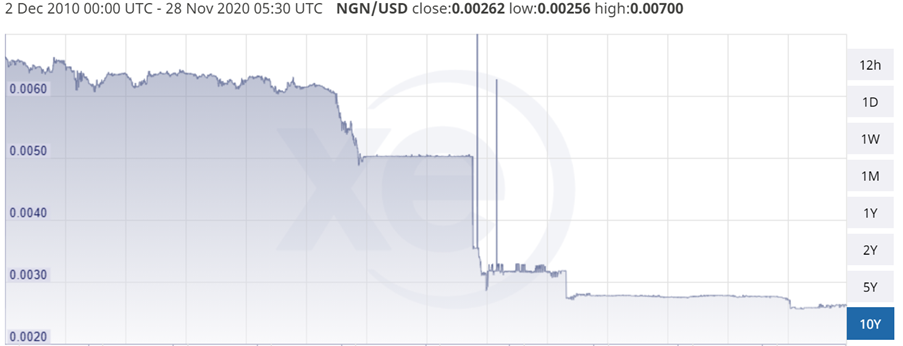Imagine being a new mother or father in a developing country right now. Your hope is to work hard and earn enough money to one day buy a house and some land, send your kids to a decent school in the city and hopefully have enough funds to see you through the expectedly difficult years of old age. Now, let’s translate that into a real-world example and bring in the variable of money. Imagine for a moment that the money you earn and save is constantly being depreciated, worth less and less in its purchasing power every passing week. If we take Nigeria as an example, the current rate of inflation is 13.7% per year, [1] for just food the inflation rate is around 16.6% per year. This means that for many Nigerians whose salaries are stagnant or low to begin with, the cost of food and ability to save is constantly being eroded as the goods around them become ever more expensive. This is a never ending cycle where 40% already live below the poverty line.

Let’s zoom out to look at this phenomenon on the macro side. The goods Nigeria exports, are worth less, meaning they are cheaper for developed countries to buy due to their exchange rate strength relative to the Nigerian Naira (the Nigerian currency). When it comes to importing goods, Nigerians will have to pay more than their international counterparts, their weaker money working against them in an increasingly uneven global marketplace. Take the example of petroleum, approximately 75% of Nigeria’s total exports are crude (unrefined) petroleum worth about $44.8bn in 2018. Much of this petroleum is bought up and refined overseas then sold back to Nigeria at a premium rate of exchange. Indeed petroleum alone represents Nigeria’s biggest single category of import (20.4%) ahead of special purpose ships (8.22%), wheat (3.37%) and cars (2.6%).
Zooming the monetary lens out further, we can observe that the U.S dollar is currently the largest global reserve currency. A global reserve currency is defined by a significant holding by central banks and financial institutions that is used for trade. According to the Society for Worldwide Interbank Financial Telecommunication (SWIFT), the U.S dollar dominates as the payment currency for global trade with a 79.5% share of inter-regional currency usage [2]. So what does this mean?
While having the national currency serve as the largest global reserve currency has benefited the U.S disproportionately, the same cannot be said for much of the rest of the world, particularly developing nations. One of the key drivers of this uneven advantage is that the U.S has been creating money ad-infinitum since coming off the gold standard in 1973 under the Nixon administration. In March 1973, the total dollars in circulation was approximately $65b, as of November 2020 that number has increased to approximately $2tn in circulation, with a further $27tn of debt. If we think of this in terms of supply and demand, the more the U.S decides to print and produce, the more it will take advantage of its position as a global reserve, the more developing countries will continue to lose out when it comes to trade and the ability to build and store wealth. The ground beneath Nigeria and many developing nations is constantly crumbling beneath their feet. The poorest people on earth are trapped in a monetary system that makes it near impossible for them to work their way out of poverty.
Enter bitcoin and cryptocurrencies.
While much can be said about the volatility and initial speculative bubble that formed in 2017, eventually popping and resulting in a 50% decline in value; the price of bitcoin has on average outperformed every single asset class since its inception. From stocks, dollars, bonds and commodities it has outperformed them all. What’s more, as there is greater institutional uptake and understanding around the use case of cryptocurrency, we are likely to see increasing rates of adoption, less volatility, and the emergence of a new digital gold standard. This means, that for developing nations like Nigeria, and the honest working moms and pops trying to make a living out there, they will be able to earn real money - one that will not slip between their fingers like sand. A bitcoin today will eventually be worth the same if not more tomorrow due to its finite supply and increasing levels of demand. Even as governments begin to unveil their own digital currencies, the pitfalls of inflation will still remain, whilst the method of transaction will leverage the benefits of blockchain it will not emulate the finite supply and network effect that bitcoin has. With bitcoin in particular, there may be hope for everyone, both in developed and particularly in developing nations, to earn and save their money. To build wealth for the next generation and escape the clutches of poverty through inflation.
* Please note that the term money and currency is used interchangeably in this article for ease of understanding. However it should be noted that there are key differences between a money and currency which you can read about here.
.png)
.png)